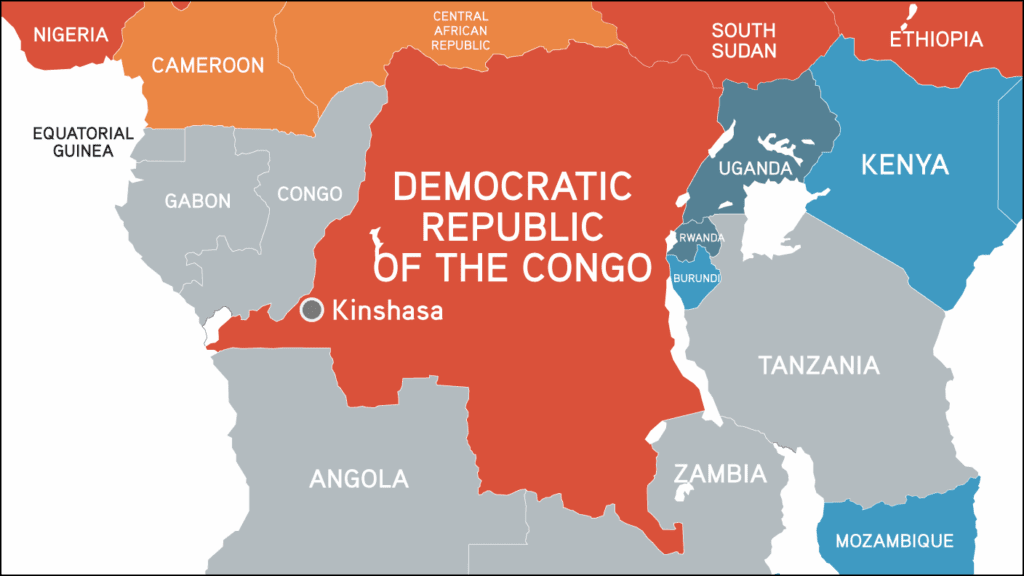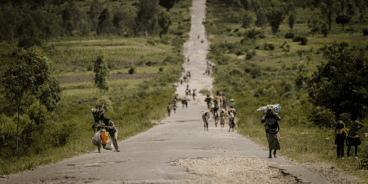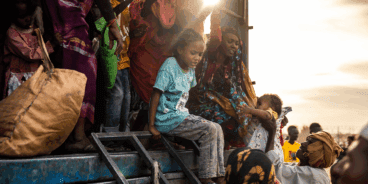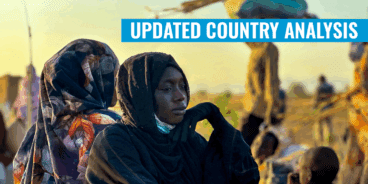Democratic Republic of the Congo

Various armed groups in the Democratic Republic of the Congo recurrently and indiscriminately attack civilian populations, committing violations that may amount to war crimes and crimes against humanity.
BACKGROUND:
Attacks by armed groups and recurring inter-communal violence have threatened populations in the eastern provinces of the Democratic Republic of the Congo (DRC) for more than 30 years. Over 120 militias and armed groups operate in Ituri, North Kivu, South Kivu and Tanganyika provinces, many regularly perpetrating widespread violations that may amount to crimes against humanity and war crimes. The UN Security Council (UNSC)-mandated Panel of Experts (PoE) has documented some armed groups allegedly executing, torturing and arbitrarily detaining civilians perceived as collaborators of enemy groups. While combating armed groups, the government’s armed forces (FARDC) and police have also been implicated in violations of International Human Rights Law (IHRL) and International Humanitarian Law (IHL), including sexual violence, torture and arbitrary killings, some of which may amount to crimes against humanity and war crimes.
Despite offensives conducted by the FARDC, supported by the UN peacekeeping mission (MONUSCO), violence has escalated in the eastern provinces for several years amidst a surge in attacks by groups like the March 23 Movement (M23), Allied Democratic Forces (ADF), Cooperative for the Development of Congo (CODECO) and the Democratic Forces for the Liberation of Rwanda, among others. Ongoing armed group activity has resulted in a marked increase in conflict-related sexual violence and grave violations against children. Recurrent clashes and insecurity have resulted in a displacement crisis, with over 7.8 million people internally displaced. Armed groups regularly perpetrate attacks against displacement sites, killing hundreds of civilians and causing further displacement.
Since 2021, when M23 re-emerged several years of dormancy, the group has perpetrated widespread attacks across North Kivu and South Kivu amid clashes with the FARDC and Wazalendo, a government-backed militia. All parties to the conflict have perpetrated IHL violations, including indiscriminate shelling, killings, sexual violence and forced displacement. The PoE and UN Human Rights Council (HRC)-mandated Fact-Finding Mission (FFM) have documented evidence of the Rwandan Defence Force (RDF) providing support to M23, with at least 3,000-4,000 soldiers fighting alongside the group.
At the start of 2025 M23 intensified its offensive in North and South Kivu, seizing the provincial capitals and consolidating control over the mineral-rich region. The clashes have been characterized by serious human rights violations and abuses, including summary executions and conflict-related sexual violence. Over half a million people have been forced to flee and displacement sites have come under heavy artillery fire amid widespread looting and indiscriminate attacks on shelters, water, sanitation and health facilities.
The International Criminal Court has been investigating serious crimes in the DRC since 2004. In June 2023 the Chief Prosecutor launched a new preliminary examination into alleged crimes committed in North Kivu since January 2022 following a DRC government request. In response to the deteriorating situation in South and North Kivu, on 7 February 2025 the HRC established the FFM and authorized a subsequent Commission of Inquiry (CoI) to investigate, among other tasks, serious human rights violations and abuses and IHL violations committed in these provinces since January 2022.
In 2023 the Congolese government requested MONUSCO’s accelerated withdrawal by the end of 2024. MONUSCO withdrew from South Kivu in June 2024 under the agreed disengagement plan. However, deteriorating security in North Kivu and Ituri, the two remaining provinces with MONUSCO presence, prompted the UN and Congolese authorities to reassess the exit strategy. On 20 December 2024 the UNSC renewed MONUSCO’s mandate for another year.
RECENT DEVELOPMENTS:
Since M23 intensified its offensive at the start of 2025, international pressure on M23 and Rwanda has increased. On 27 June the DRC and Rwanda signed a United States (US)-brokered peace agreement, committing to cease hostilities in North and South Kivu, respect territorial integrity and end support for non-state armed groups. Separate negotiations mediated by Qatar between the DRC government and M23 are ongoing.
On 5 September the FFM released its report, concluding that all parties – namely M23, RDF, FARDC, Wazalendo and affiliated groups – perpetrated violations that may constitute war crimes and/or crimes against humanity. M23 likely committed the crimes against humanity of torture, sexual violence and enforced disappearance, asserting that most crimes intended to “degrade, punish and break the dignity of the victims.” The FARDC, Wazalendo and other allied militias committed deliberate killings of civilians, widespread sexual violence, looting and the forcible recruitment and use of children.
With FARDC forces redeployed to counter M23, other armed groups, particularly the ADF and CODECO, have exploited the security vacuum in North Kivu and Ituri provinces. According to MONUSCO, 1,087 civilians have been killed in Ituri and North Kivu since June. There has been a marked increase in violence in Ituri province since late July, with MONUSCO documenting attacks in Djugu territory that have targeted civilians, including at displacement sites.
ANALYSIS:
For decades, various armed groups have exploited the absence or weakness of state authority in eastern DRC to perpetrate attacks against civilians. Rampant impunity and competition for control of profitable minerals have enabled the proliferation of such groups. Ethnically motivated and deliberate attacks against displaced Congolese have led to waves of secondary displacement while sexual violence continues to be used as a weapon of war. Widespread armed group activity has impeded MONUSCO’s ability to protect civilians and conduct life-saving operations, leaving populations vulnerable.
The resurgence of M23, a group with a history of perpetrating widespread abuses and war crimes against civilians, has exacerbated regional tensions and contributed to the militarization of mining sites. Ongoing clashes between FARDC and M23 have fueled hate speech and discrimination, heightening grievances and the risk of further atrocities and a regional conflict. The government risks complicity in crimes perpetrated by FARDC-aligned ethnic militias that have abusive records.
A military solution will not resolve the political, social and economic drivers of the conflicts in the eastern provinces, including the illegal exploitation of natural resources and ethnically motivated attacks. The US-mediated peace deal offers a rare diplomatic opening, but it lacks key commitments to justice, accountability and redress. In parallel with the ceasefire agreement, a proposed US-brokered critical minerals deal risks replicating extractive dynamics that have fueled conflict in eastern DRC.
RISK ASSESSMENT:
-
-
- Continuous hostilities inflicting large-scale civilian casualties and destruction of critical infrastructure.
- Armed groups consolidating political and economic authority amid unprecedented levels of illegal mining exploitation and cross-border smuggling.
- Widespread conflict-related sexual violence, disproportionately impacting displaced women and girls.
- Alarming scale of children recruitment and use by myriad armed actors.
- Existing security vacuum in eastern DRC, emboldening other armed groups to remobilize and target civilians.
-
NECESSARY ACTION:
All forces operating in the DRC must prioritize the protection of civilians and compliance with IHL and IHRL. The FARDC should implement a vetting process to identify and provisionally remove individuals who may have been implicated in serious human rights violations, and cease using abusive militias as proxy forces. The FARDC and police should thoroughly investigate and publicly report on any violations by their forces. Rwanda should end its military support for M23 and respect the DRC’s territorial integrity.
The international community should suspend military assistance to governments backing armed groups, ensure that any support – financial or otherwise – does not fuel human rights abuses and intensify pressure on all parties to halt support for armed actors, guarantee humanitarian access and commit to genuine peace efforts. Accountability must be central, including support for the operationalization of the HRC-mandated CoI. All parties should implement the recommendations from the FFM and the Team of International Experts on the DRC.
Any forthcoming mineral trade deal must prioritize human rights, civilian protection and environmental safeguards, as well as strengthen supply chain due diligence and ensure equitable benefit-sharing.
Atrocity Alert No. 457: Sudan, Israel and the Occupied Palestinian Territory and Democratic Republic of the Congo
Related Content

Atrocity Alert No. 463: Democratic Republic of the Congo, Venezuela and Myanmar (Burma)

Atrocity Alert No. 459: Sudan, Ukraine and Conflict-Related Food Insecurity
